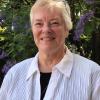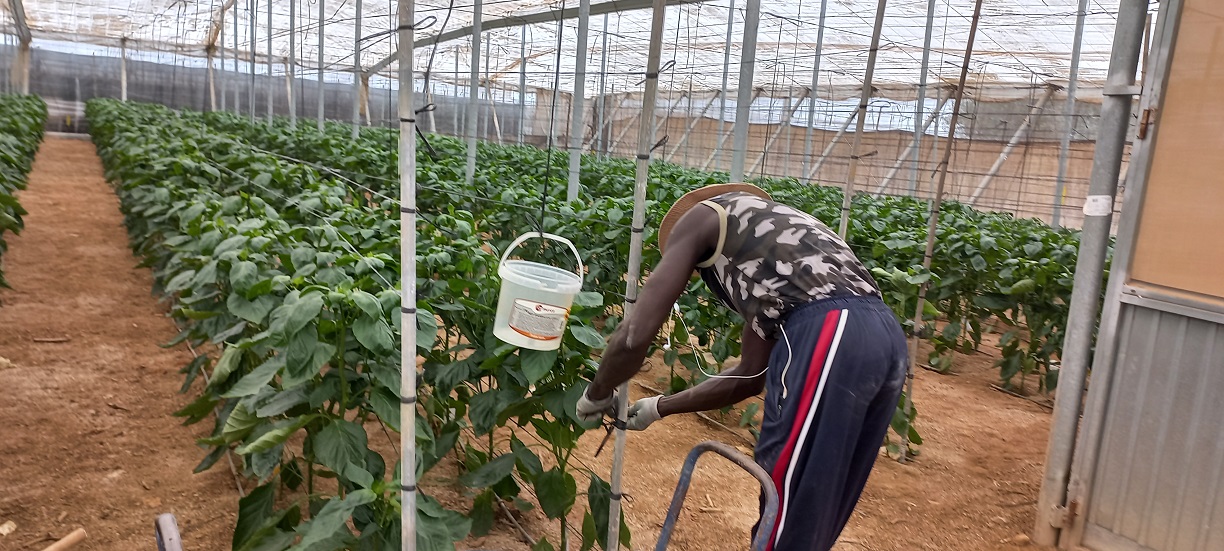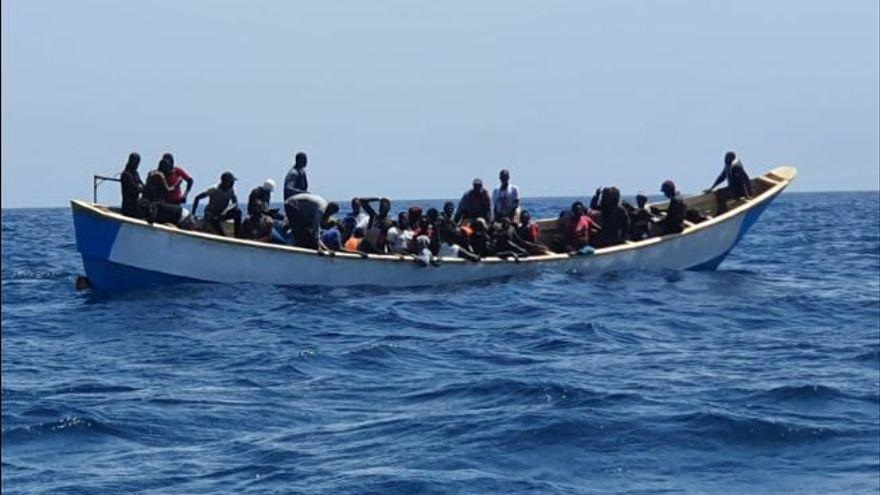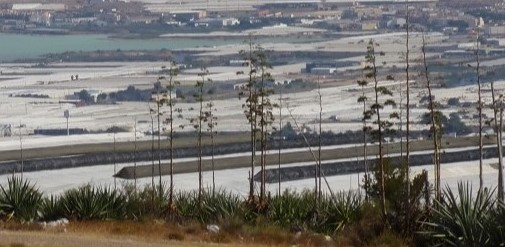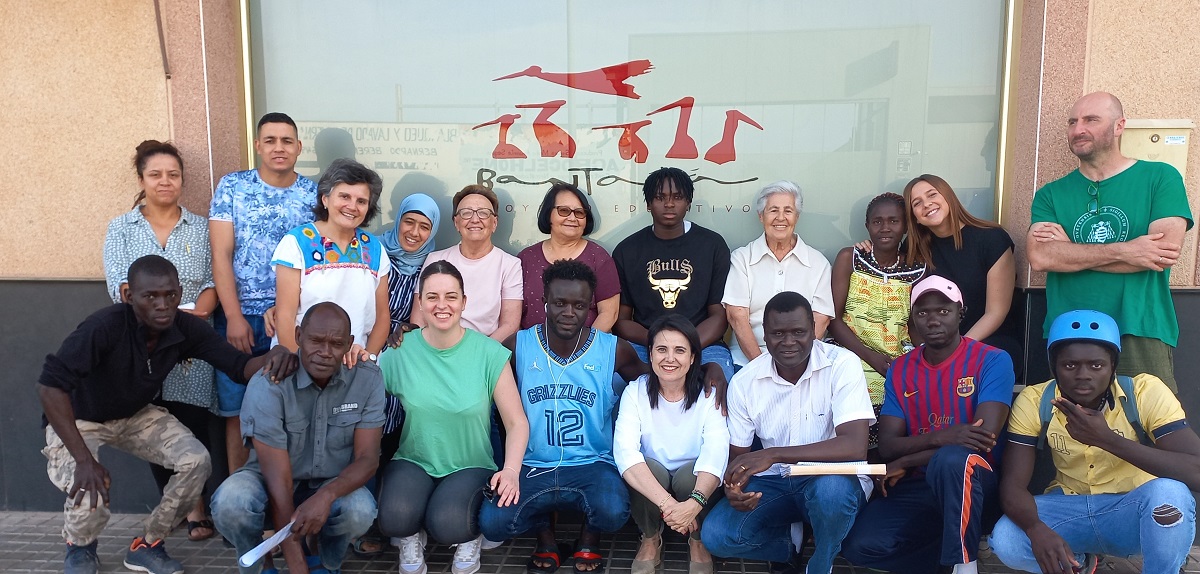
Sr. Fátima Santaló-Osorio, third from left in the top row, with sisters, volunteers, and migrants from the Bantabá Project in Almería, Spain. (Courtesy of Fátima Santaló-Osorio)
Editor's note: Global Sisters Report's new series,"Welcoming the Stranger," takes a closer look at women religious working with immigrants and migrants. While we cover this topic often, this series features sisters and organizations networking to better serve those crossing borders, global migration trends and the topic of the issue of immigration in the upcoming U.S. presidential election.
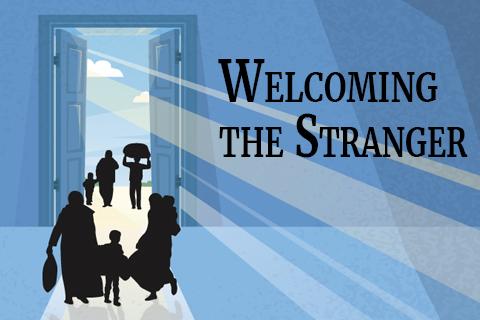
Rosa arrived in Spain like most Latin Americans who travel with the purpose of finding a job that will provide them with income to be able to send money back to their countries of origin. The money will enable her relatives to live a little more comfortably, pay off debts and, in addition, give their children the possibility to access studies that will give them more opportunities than these people have had.
She traveled from her country, confident that someone would welcome her upon her arrival and help her in those first difficult moments of getting to know other people, another culture, and other customs.
When a woman arrives at customs, she comes with the “lesson learned,” because the questions and answers are practically memorized. They know, on both sides of the border, that she is not coming on vacation but to work; yet, she will have to wait three years until she receives legal status. In the meantime, she risks the possibility of not finding work, or of having to accept what she is offered even if the conditions are unjust.
Religious Sisters of the Sacred Heart of Jesus support the growing migrant population that sustains local agriculture in El Ejido, Almeria, through the Bantabá socio-educational center.
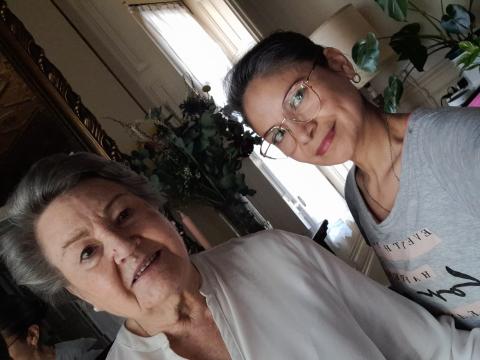
Rosa, a migrant welcomed in Spain, and Miren Ajuria, the mother of the author of the article. (Carmen Notario)
Rosa’s call was not answered by her contact the first day nor the second, and she ended up sleeping in the street, scared to death and not knowing what to do; of course, without mentioning anything to her family so that they would not worry.
A charitable person took her to the local city shelter where she could at least eat, sleep and wash herself; and, little by little, she met people who offered her a few hours of work.
I met her because one of my brothers works in that shelter, and when a colleague found out that my family was looking for someone who could live with our mother and care for her, she didn't hesitate to recommend Rosa.
It will soon be one year that she has been with us. I say this because she has become a person who is very loved by everyone, especially for her attention to details, sensitivity, affection and good work.
Rosa has been lucky and, although she has not been in the country for three years, as of May 1, 2024, she has legal status and can contribute to Social Security.
In Spain, we are going through a long process of legalization of people who reside in irregular situations. The legislative proposal seeks to legalize migrants who have been here since before November 2021. It is a popular initiative that began that same year, and that obtained more than 700,000 signatures to submit to the Congress of Deputies.
On April 9, 2024, the plenary of the Congress approved the consideration of this popular legislative initiative (ILP), thanks to the support of all political groups, except Vox, which voted against it and remained alone in its position.
This proposal calls for an amendment to Organic Law 4/2000 on the rights and freedoms of foreigners in Spain and their social integration, and requests that "the Government, by Royal Decree,” establish, "within six months, a procedure for the legalization of foreigners who are in Spanish territory before November 1, 2021."
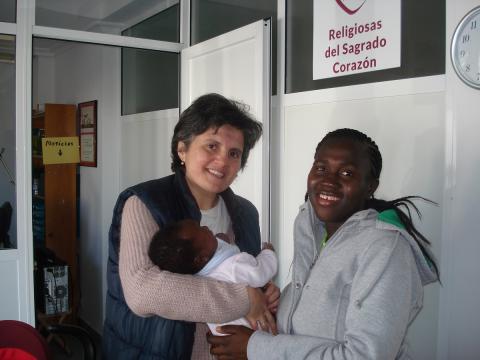
Sr. Fátima Santaló-Osorio with a migrant woman and her baby. (Courtesy of Fátima Santaló-Osorio)
A community of Religious of the Sacred Heart of Jesus has been living in El Ejido, a municipality in the Andalusian province of Almeria, for 50 years. Sr. Fátima Santaló-Osorio, who has been there since 2015, agreed to tell me about the work they do and how she feels in that reality.
Sister explained to me that, since the beginning, the sisters have worked with people coming from other parts of Spain. As intensive greenhouse agriculture grew, people began to arrive from Morocco, Senegal, Guinea Bissau, Ghana, the Ivory Coast, Mali and Mauritania. Today, these people are essential to sustaining the agricultural activity that feeds Europe.
In 2000, after listening to the needs of the people, the Bantabá project was born, which is focused on migrants arriving from many parts of the Mediterranean; practically all the people who come are in an irregular situation in Spain. Volunteers, who come during the summer for 15 days, make it possible to give Spanish classes to more than 200 people in this place.
Migrants also come to Bantabá to ask for advice and information or to carry out a procedure, and the sisters take special care to welcome them and establish a personal relationship with them.
In this regard, Santaló-Osorio commented: "I feel, we feel, that we are in a privileged place. Really, being here — in this place, among all these young people, these women — has been a gift to us. We came for others ... and the arrival of the migrants found us here.
This Sister of the Sacred Heart of Jesus believes that the sisters of her congregation have been able to combine their educational experience with the great need of the migrants to learn Spanish: "But not only to learn, [because] we offer a second chance to so many people who have never picked up a pencil or held a book in their hands in their own country. Above all, we try to make them feel at home, and we all work together to build a diverse but integrated society, although there is still so much work to be done for this!” she warned.
Santaló-Osorio also encounters God in her work with migrants:
Lord, these are my cathedrals; I adore you here. I want to adore you and recognize you in all the men and women who leave their homeland in search of better opportunities. They abandon their loved ones in order to work and earn a living for themselves and their families in a place where they are not always welcomed, and where those who welcome them look at them with suspicion and sometimes rejection. I want to let myself be touched by the lives of people who suffer and struggle; and to offer myself by making real the surrender of Jesus so that, together with my brothers from other places, we can endure life, and learn from the strength and generosity that I witness daily to serve them in the little things I do for them and with them.
The sisters recognize that there is often a desire to help people in vulnerable situations and, paradoxically, those who end up benefiting are the ones doing the helping. They have observed that, in this process, those considered “poorer” can play a fundamental role in evangelizing those they seek to help.
I want to share with the community of Global Sisters Report some of the reality of migrants in Europe, especially in Spain. These are just a few small examples of situations that are widespread in many countries, and that require us to take a stand in the concrete things we can do.
Caring for the dignity of each person, to denouncing injustice, and struggling to offer others real opportunities is the task of every Christian. Walking with our sisters and offering them the opportunity to reach their full potential is the privilege granted to us as disciples of the master.
Thank you, sisters, for your witness!

